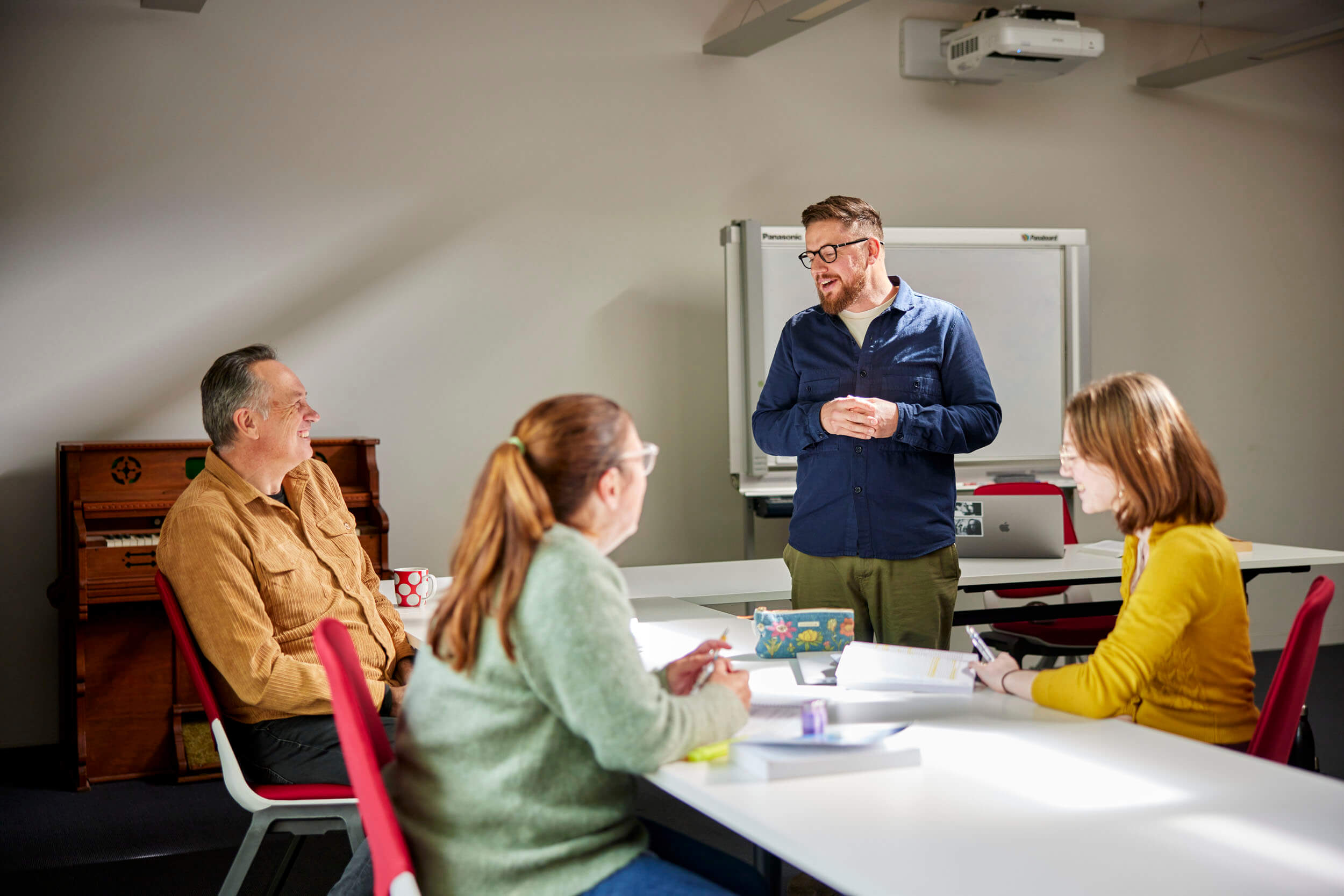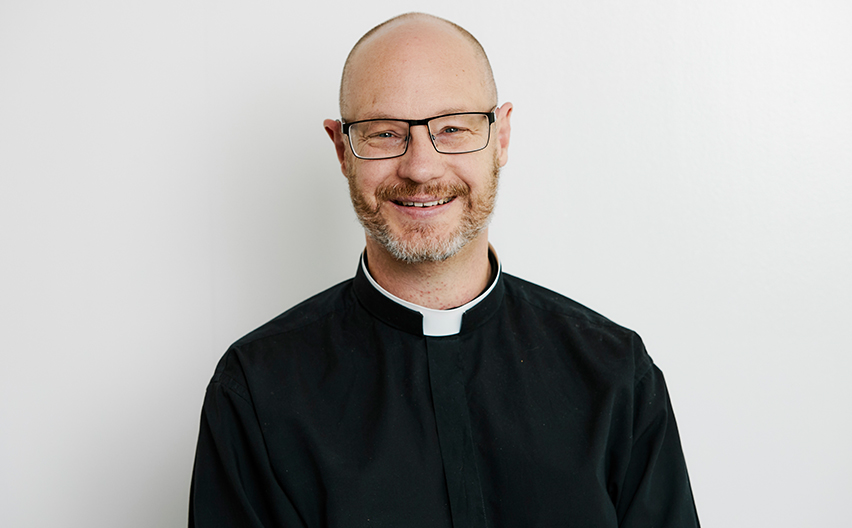


What are your areas of interest or specialisation?
The theologies of Karl Barth (1886–1968), Markus Barth (1915–1994), and Dietrich Bonhoeffer (1906–1945)
- Post-Holocaust theologies
- Jewish-Christian relations
- The history of Christian doctrine
Having studied church history and Holocaust history during my undergraduate degree, I was looking for ways in which I could combine the two interests for my doctoral work. Recommendations from friends put me on to the life and work of Dietrich Bonhoeffer and, through reading him, I began to encounter Karl Barth’s theology.
Both of these men were active in church leadership in Germany during the Hitler years, and were both heavily involved in resistance movements against Nazism, so were perfect case studies for my PhD. That work – on theological resistance to Nazism and the Holocaust – took me into the area of Jewish-Christian reconciliation and post-Holocaust theology, both as areas of academic interest as well as ecclesial commitment.
In recent years, I have become increasingly interested in the theology of Markus Barth (Karl’s eldest son), who was himself a New Testament scholar of considerable repute. Last year, I signed a publication contract to write his authorised biography.
What do you enjoy most about working at Trinity College?
The faculty and staff in the Theological School – it’s the best team I have ever worked with in 20-plus years of university and church work. They are frighteningly intelligent, but far more than that, deeply generous, unfailingly kind, and hilariously funny!
I also recognise how privileged I am to be able to go to work each day and do what I love – teaching students, and seeing them develop in their understanding and faith; and researching those things about which I am passionate.
How would you describe Trinity’s theological community?
Prayerful, scholarly, and generous.
I cherish the fact that we begin each working day with Morning Prayer, said together as a community of teachers and students, and that – at least in more ‘normal’ times – we share in Eucharist at least once a week, and (for some of us) in the beauty of Choral Evensong. These moments of worship provide a rhythm to our week and our work, reminding us that our lecturing, studying, researching and writing are done not for their own sake – as pieces of intellectual curiosity – but in the service of God and his church.
I cherish the fact that our theological community is indeed a community of scholars; that we share together in a genuine curiosity to learn more, and to share what we learn. Of course, as part of that curiosity there is an implicit – and sometimes explicit – acknowledgment that, no matter how long we’ve been doing this, there is still so much we don’t know. It’s a great reminder that a necessary adjective for the study of theology is that it be … modest. I love the fact that I work and learn in a community in which scholarly attainment leads, not to arrogant certainty, but to a modest asking of yet more questions.
Finally, I love the fact that the TCTS community is generous. Whether it be the Chapel, the common room, or the lecture rooms, ideas and people – no matter how wacky! – are welcomed in, not shut out. To me, that’s a fundamental ingredient to the gospel. And I am proud of the fact that I can be part of a community where we actively encourage people and ideas from the margins, as much as from the centre – and hopefully, even more so!
Current research projects
I have just published my fourth monograph, on the historical development of the doctrine of election (God Has Chosen, IVP Academic, 2020). That closes out a project I have been working on for the past six years.
My next major project, which is already well underway, is to write the first authorised biography of Markus Barth (1915–1994) – eldest son of Karl Barth, New Testament scholar, and pioneer in post-war Jewish-Christian dialogue. Working closely with the Barth family, as well as with archival material from Basel, and Princeton Theological Seminary, the book is due for completion in December 2022. It will be published with IVP Academic, with whom I already have a contract.
What is one of your favourite Bible verses and why?
2 Corinthians 5:19
This verse proclaims, perhaps more concisely than any other, the extravagant generosity of God’s love. Whether we know it or not – whether in fact we believe it or not – God has reconciled, not just some people, and certainly not just Christians, but the entire world (cosmos, if we take the Greek seriously) back to himself. It’s done; it’s completed; and there is nothing we can do – no moral failing, or even unbelief – to change the objective reality of that reconciled state in which we now exist.
Where does your interest in theological study come from?
I grew up in a Christian family, and in a church environment, in which theological conversations were encouraged, and no question was ever considered ‘out of order’. It helped that my uncle, Noel Vose, was the founding principal of the Baptist Theological College of WA (now, Vose Seminary) – and from my early high school days, he and I would often discuss questions of faith and Christian practice. He encouraged me to read widely, and to ask probingly. Of course, I ended up in a different part of the Christian tradition to him – were he still alive, he would disagree strongly with (for example) my affirmations of infant baptism, and of the real presence of Christ in the Eucharist. But he was also a passionate ecumenist, and so I know that he would nevertheless rejoice that I have found, as he did, a life in theology.
When you were a child, what did you want to be when you grew up?
Age 6: a farmer, because I liked red tractors
Age 11–18: a forensic pathologist
What’s your favourite book and why?
Asking academics what their favourite book is seems slightly unfair – we read so much that it’s hard to single out just one. So, putting aside what I read ‘for work’, one of my favourite books of recent years has been Room by Emma Donoghue. Donoghue manages to treat the most horrific of circumstances – a mother and her small child imprisoned for years in a small, single-roomed, shed with the most tender of narrations.
What would make the world a more peaceful place?
I don’t think I can put it any better than the Catholic theologian Hans Küng:
‘No peace among the nations without peace among the religions;
No peace among the religions without dialogue between the religions;
No dialogue between the religions without investigation of the foundation of religions.’
